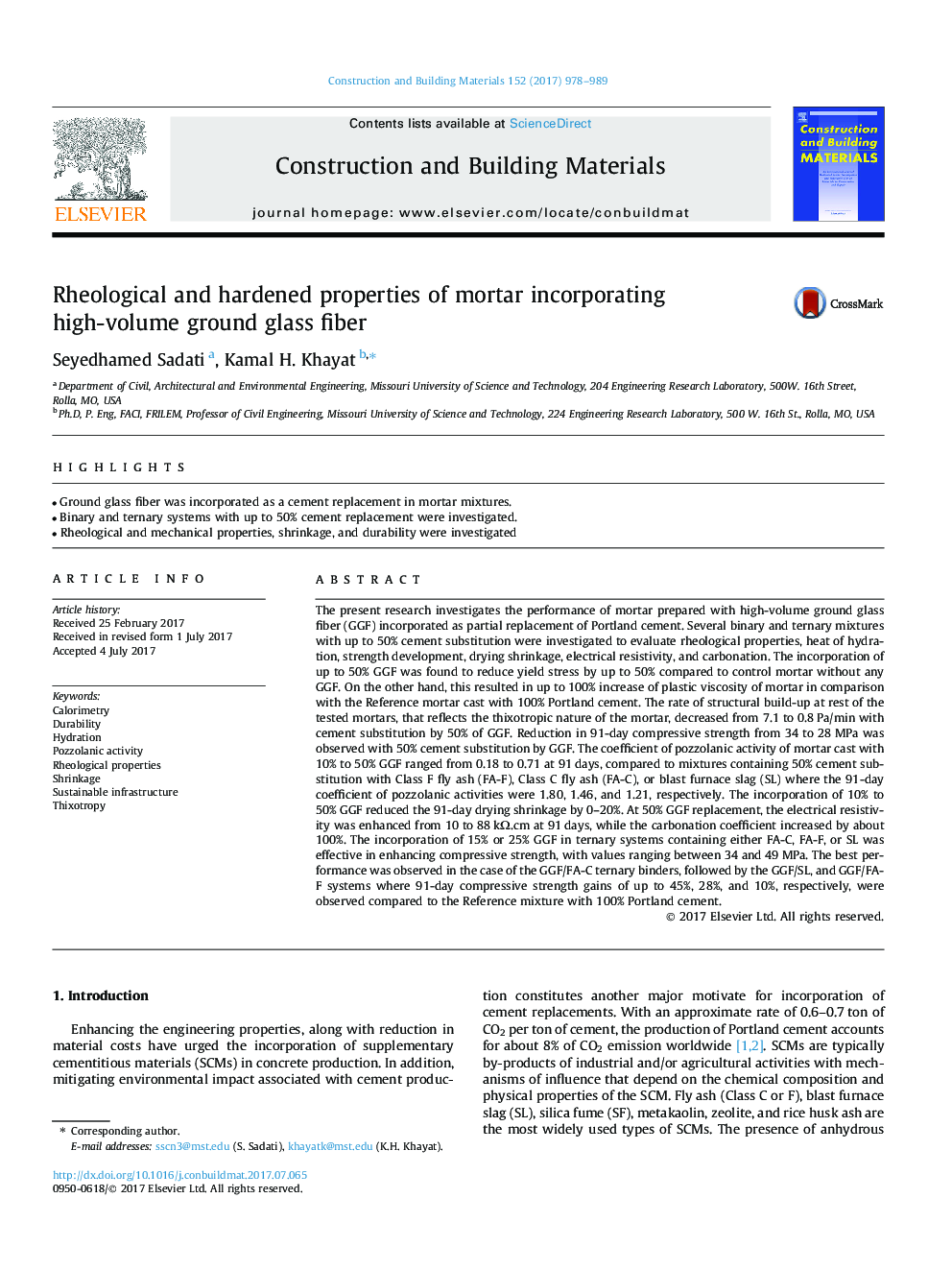| کد مقاله | کد نشریه | سال انتشار | مقاله انگلیسی | نسخه تمام متن |
|---|---|---|---|---|
| 4912826 | 1428754 | 2017 | 12 صفحه PDF | دانلود رایگان |
عنوان انگلیسی مقاله ISI
Rheological and hardened properties of mortar incorporating high-volume ground glass fiber
ترجمه فارسی عنوان
خصوصیات رئولوژیک و سخت شده از ملات که شامل فیبر شیشه ای با حجم بالا است
دانلود مقاله + سفارش ترجمه
دانلود مقاله ISI انگلیسی
رایگان برای ایرانیان
کلمات کلیدی
موضوعات مرتبط
مهندسی و علوم پایه
سایر رشته های مهندسی
مهندسی عمران و سازه
چکیده انگلیسی
The present research investigates the performance of mortar prepared with high-volume ground glass fiber (GGF) incorporated as partial replacement of Portland cement. Several binary and ternary mixtures with up to 50% cement substitution were investigated to evaluate rheological properties, heat of hydration, strength development, drying shrinkage, electrical resistivity, and carbonation. The incorporation of up to 50% GGF was found to reduce yield stress by up to 50% compared to control mortar without any GGF. On the other hand, this resulted in up to 100% increase of plastic viscosity of mortar in comparison with the Reference mortar cast with 100% Portland cement. The rate of structural build-up at rest of the tested mortars, that reflects the thixotropic nature of the mortar, decreased from 7.1 to 0.8 Pa/min with cement substitution by 50% of GGF. Reduction in 91-day compressive strength from 34 to 28 MPa was observed with 50% cement substitution by GGF. The coefficient of pozzolanic activity of mortar cast with 10% to 50% GGF ranged from 0.18 to 0.71 at 91 days, compared to mixtures containing 50% cement substitution with Class F fly ash (FA-F), Class C fly ash (FA-C), or blast furnace slag (SL) where the 91-day coefficient of pozzolanic activities were 1.80, 1.46, and 1.21, respectively. The incorporation of 10% to 50% GGF reduced the 91-day drying shrinkage by 0-20%. At 50% GGF replacement, the electrical resistivity was enhanced from 10 to 88 kΩ.cm at 91 days, while the carbonation coefficient increased by about 100%. The incorporation of 15% or 25% GGF in ternary systems containing either FA-C, FA-F, or SL was effective in enhancing compressive strength, with values ranging between 34 and 49 MPa. The best performance was observed in the case of the GGF/FA-C ternary binders, followed by the GGF/SL, and GGF/FA-F systems where 91-day compressive strength gains of up to 45%, 28%, and 10%, respectively, were observed compared to the Reference mixture with 100% Portland cement.
ناشر
Database: Elsevier - ScienceDirect (ساینس دایرکت)
Journal: Construction and Building Materials - Volume 152, 15 October 2017, Pages 978-989
Journal: Construction and Building Materials - Volume 152, 15 October 2017, Pages 978-989
نویسندگان
Seyedhamed Sadati, Kamal H. Khayat,
